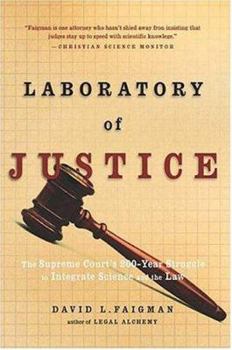Laboratory of Justice: The Supreme Court's 200-Year Struggle to Integrate Science and the Law
Select Format
Select Condition 
Book Overview
"Faigman is one attorney who hasn't shied away from insisting that judges stay up to speed with scientific knowledge." "-The Christian Science Monitor" Suppose that scientists identify a gene sequence that predicts the likelihood that a person will commit a serious crime in the future. Laws are passed making genetic tests mandatory, and anyone displaying the genes is sent to a treatment facility. Would the laws be constitutional? In this illuminating...
Format:Paperback
Language:English
ISBN:0805078452
ISBN13:9780805078459
Release Date:May 2005
Publisher:Holt McDougal
Length:432 Pages
Weight:1.25 lbs.
Dimensions:1.1" x 5.8" x 9.0"
Customer Reviews
1 rating
A Fascinating View of the Supreme Court
Published by Thriftbooks.com User , 19 years ago
For those of us who primarily hear about Supreme Court cases through the news or at school, it is easy to forget that the actual Court decision that emerges from a case is the complex interaction of nine individuals interpreting the law and the facts. This book explores in fascinating detail how the Supreme Court's landmark decisions are very much a human endeavor reflecting the different justices' world views. While Faigman uses the justices' understanding of science (or sometimes misunderstanding) in making their legal decisions as his primary prism to examine the Court, the book is anything but simply a "law and science" book. To me, it was much more about how the justices bring their individual strengths and weaknesses, their hopes and fears as human beings, to deciding cases with profound implications for society. I always had assumed, for example, that Justice Taney, who decided the infamous Dred Scott decision that saw slaves as property to be owned, must have been a bigoted villain. While Taney by no means emerges from Faigman's telling as a hero, he does become much more of a three-dimensional figure, one who had deep personal qualms about slavery but who, in a terribly misguided way, thought he was saving the Union by his opinion in Dred Scott. In chapter after chapter, Faigman similarly shows how Court decisions that we have all heard of, like Brown v. Board of Education, are much more than simply decisions reflecting "The Law," but reflect individual justices' struggles with changing scientific and social understandings. I don't know if the author meant the title "Laboratory of Justice" to have another meaning beyond looking at how the Court tries to adapt the law as science changes our understanding of the world around us, but as I read the book, I did find myself thinking of the justices not as the scientists running the "laboratory of justice" but as part of the experiment itself going on in the laboratory of justice. This is a superb book for anyone who wants to gain insight into the Court's workings as told by someone with a keen eye for interesting facts that are insightful and entertaining at the same time.





